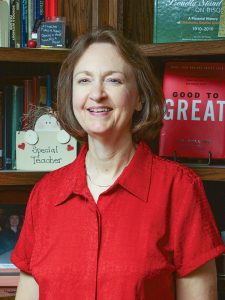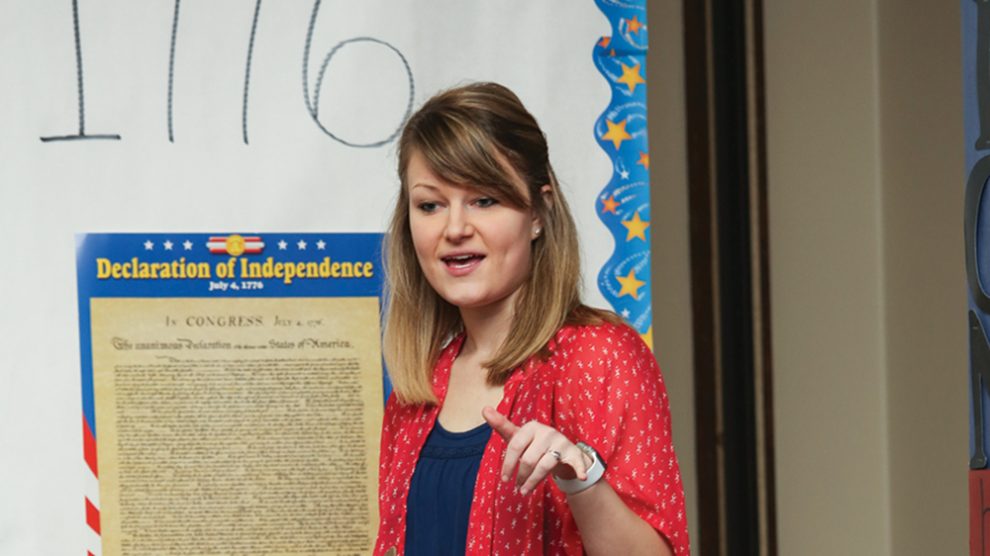
Q&A with Pam Robinson, Dean of the College of Humanities and Social Sciences
Why is it important to study the humanities and social sciences?
These two broad areas make up a large part of OBU’s liberal arts education. Looking at the question from that standpoint, I would consider today’s job market. Certainly, some careers require a very specific training, such as nursing, teaching and engineering to name a few; however, it is safe to say all employers seek applicants who can think critically and solve complex problems; who possess collaborative skills; and, who can communicate well. A liberal arts education provides a strong foundation for our students, which in turn contributes to their ability to adapt, regardless of the nature of their job. The College of Humanities and Social Sciences plays a large role in the liberal arts education for all students on Bison Hill.
Why should students come to OBU if they want to pursue a degree in the fields of behavioral and social sciences, kinesiology and leisure studies, language and literature, or teacher education?
In general, I would point to our stellar faculty. We are set apart by the academic pursuits of our faculty, by the way they connect with students, by our commitment to the liberal arts, by our commitment to lifelong learning, and by our commitment to the integration of faith and discipline.
The Division of Behavioral and Social Sciences includes psychology, sociology, criminal justice, family science, anthropology, political science and history. The psychology faculty continue to do research and work in the field of psychology. They serve on state-level councils and committees making decisions affecting the whole state. The faculty for criminal justice worked in the justice system. Our historians study the works of notable historians so they are able to speak to history beyond the simplistic timelines of given events. They speak of the “why” and the “how” and the effects of specific events to invoke that critical thinking within each student.
The Division of Language and Literature has the distinction of being the workplace of Dr. Ben Myers, Oklahoma’s Poet Laureate, for 2015-16. The progression of English Composition I through the two literature courses is a key component of the liberal arts program. As a result, students in every major are given the tools to write well.
Beginning fall 2017, the Division of Kinesiology and Leisure Studies will be called the Division of Health and Human Performance. This is especially appropriate as we begin a new emphasis on health, to include research components, even at the undergraduate level. Pre-allied health continues to be a choice for many students. Typically, these students go on to apply to graduate programs in physical therapy. On the leisure studies side, sports ministry comes to the forefront.
In the Division of Teacher Education, we view teaching as a mission, a high calling. We view the classroom as a mission field. While a teacher cannot proselytize in the classroom, he or she can model and exhibit those attributes unique to a Christian. All faculty in teacher education must have served in a P-12 setting relative to their area of expertise. As well, all faculty in teacher education must spend time in current classroom settings to ensure currency in the ever-changing education system. Teacher candidates leave the program prepared to be effective teachers who share Christ’s love in every situation.
What sets an OBU College of Humanities and Social Sciences degree apart from other Christian and Baptist universities?
Regardless of career path, students learn about a complex world and how to navigate that world as they gather information to solve problems. They learn to look at the world through a Christian worldview. This is not just being able to state how their Christianity and a given career path integrate; rather, it is viewing their career through the Christian lens. Much like C.S. Lewis once said, “I believe in Christianity as I believe that the sun has risen: not only because I see it, but because by it I see everything else.” By the light of Christianity, we see the discipline or the career path.
When students graduate with degrees from the College, what careers are they prepared for? What types of positions or fields of study might they work in?
We prepare stellar teachers who are in demand across the United States, many winning teacher of the year honors by their site or district. We prepare students for successful careers in law where they may become an attorney or choose to work as an analyst. We provide a solid educational foundation for those who desire to work in higher education. Many are inspired and encouraged by our faculty to pursue a terminal degree, and we prepare our students well to attend graduate school to continue preparation for their chosen career.
Those majoring in Pre-Allied Health are often on the pathway to attend graduate school for the Doctor of Physical Therapy. Many of our majors use their skills on the mission field whether they majored in Spanish to serve in a Spanish speaking country or they are using their degree as a door into a certain country. Many of our graduates are working in sports ministry or combining their sports ministry degree with youth ministry.
What does the future of the College of Humanities and Social Sciences hold at OBU?
One of my continuous goals is to keep each area on “the cutting edge.” This concept is easily applied to the hard sciences where research continually results in new discoveries. The concept is a little more obscure in the social sciences, but nonetheless important. This includes knowing and practicing good pedagogy, but it also means preparing students for the jobs of tomorrow—jobs we don’t even know will exist in the next 10 years, placing greater importance and value on their liberal arts training. I want to see education classrooms equipped with the latest technology so that our teacher candidates are ready for tomorrow. Tomorrow’s students will use technology at every turn, and our future teachers need to be prepared. I want to see a state-of-the-art human performance lab where we can conduct research and even serve community needs.
I want OBU to be the first thought when that company needs a good writer for a given project. I want OBU to be the first thought when the local genealogy group wants a presentation on how to integrate family research and history. I want OBU to be the first thought when a school district desires information on the many ways to teach reading or the integration of children with disabilities into the general classroom. I want OBU to be the first thought when a church needs direction to facilitate a church recreation program.


